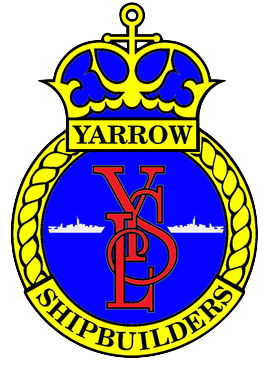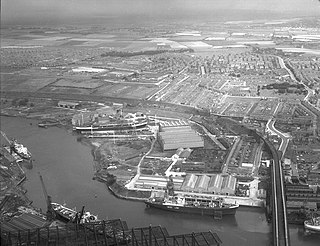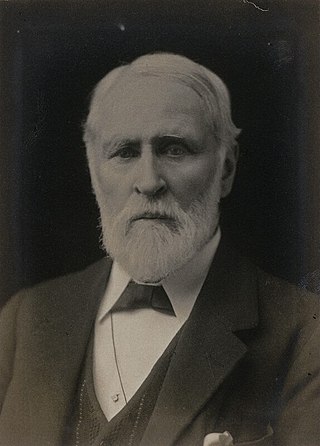Related Research Articles

Vickers was a British engineering company that existed from 1828 until 1999. It was formed in Sheffield as a steel foundry by Edward Vickers and his father-in-law, and soon became famous for casting church bells. The company went public in 1867, acquired more businesses, and began branching out into military hardware and shipbuilding.

Wallsend is a town in North Tyneside, Tyne and Wear, England, at the eastern end of Hadrian's Wall. It has a population of 43,842 and lies 3+1⁄2 miles east of Newcastle upon Tyne.
Upper Clyde Shipbuilders (UCS) was a Scottish shipbuilding consortium, created in 1968 as a result of the amalgamation of five major shipbuilders of the River Clyde. It entered liquidation, with much controversy, in 1971. That led to a "work-in" campaign at the company's shipyards, involving shop stewards Jimmy Airlie and Jimmy Reid, among others.
Vickers-Armstrongs Limited was a British engineering conglomerate formed by the merger of the assets of Vickers Limited and Sir W G Armstrong Whitworth & Company in 1927. The majority of the company was nationalised in the 1960s and 1970s, with the remainder being divested as Vickers plc in 1977.

Swan Hunter, formerly known as Swan Hunter & Wigham Richardson, is a shipbuilding design, engineering, and management company, based in Wallsend, Tyne and Wear, England.
British Shipbuilders (BS) was a public corporation that owned and managed the shipbuilding industry in Great Britain from 1977 through the 1980s. Its head office was at Benton House in Newcastle upon Tyne, England.

The Aircraft and Shipbuilding Industries Act 1977 is an Act of the Parliament of the United Kingdom that nationalised large parts of the UK aerospace and shipbuilding industries and established two corporations, British Aerospace and British Shipbuilders (s.1).

Yarrow Shipbuilders Limited (YSL), often styled as simply Yarrows, was a major shipbuilding firm based in the Scotstoun district of Glasgow on the River Clyde. It is now part of BAE Systems Surface Ships, owned by BAE Systems, which has also operated the nearby Govan shipyard since 1999.
Wallsend Slipway & Engineering Company Ltd was formerly an independent company, located on the River Tyne at Point Pleasant, near Wallsend, Tyne & Wear, around a mile downstream from the Swan Hunter shipyard, with which it later merged.
Seawind Barclay Curle is a British shipbuilding company.

Palmers Shipbuilding and Iron Company Limited, often referred to simply as "Palmers", was a British shipbuilding company. The Company was based in Jarrow, County Durham, in north-eastern England, and also had operations in Hebburn and Willington Quay on the River Tyne.
R. & W. Hawthorn, Leslie and Company, Limited, usually referred to as Hawthorn Leslie, was a shipbuilder and locomotive manufacturer. The company was founded on Tyneside in 1886 and ceased building ships in 1982.

William Doxford & Sons Ltd, often referred to simply as Doxford, was a British shipbuilding and marine engineering company.

John Readhead & Sons was a shipyard on the River Tyne in South Shields, Tyne and Wear, England.

Austin & Pickersgill is a shipbuilding company formed in Sunderland in 1954.

A&P Group Ltd is the largest ship repair and conversion company in the UK, with three shipyards located in Hebburn, Middlesbrough and Falmouth. The company undertakes a wide variety of maintenance and repair work on commercial and military ships with projects ranging from a two-day alongside repair period through to multimillion UK pound conversion projects lasting for a year or more.
The Grangemouth Dockyard Company was a British shipbuilding and ship repair firm located at Grangemouth, on the Firth of Forth, Scotland.

George Clark & NEM was a leading British marine engineering business. The Company was based in Sunderland and was a major employer in the area.

Sir George Burton Hunter was an English shipbuilder based on Tyneside.
The Furness Shipbuilding Company was a shipbuilding company in Haverton Hill, Stockton on Tees, England. It was established during the First World War and operated from 1917 until 1979.
References
- 1 2 3 4 5 Tyne & Wear Archives: Report on Access to Shipbuilding Archives in the North East of England Archived 2013-11-03 at the Wayback Machine
- ↑ Tyne & Wear Archives: user guide Archived 4 March 2011 at the Wayback Machine